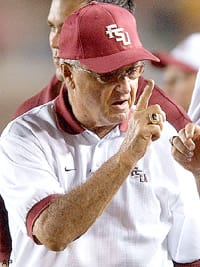NCAA rule was long overdue

On those occasions when the NCAA does things right, we should be quick to praise them.
We won't even ask why it took so long.
Advertisement
In 2001, the NCAA allowed schools to put men's and women's basketball players on scholarship beginning with the summer before their freshman seasons in an effort to improve sagging graduation rates in those sports.
This year the NCAA expanded that provision to include all sports, meaning athletes could get some credit hours under their belts before the fall crush and know their way around campus.
What does it mean? The hope everywhere is it will mean a jump on academics and a chance to graduate in five years. An offshoot is it also might mean more freshman football players will be able to contribute sooner.
"They can work out and run and throw passes with the other players, but the fact that they're here getting familiar with the university and the academics of the university, I think that really helps them," Florida State coach Bobby Bowden said.
While all coaches are quick to point out the academic benefits, they also are well aware this gives them a chance to get those prized recruits at key positions (read: fills a desperate need) ready to take the field from day one.
"They'll be a lot further along than they would have been had they not been here, there's no doubt about it," Bowden said. "What we'll do is slowly work them in and see what they can handle. Some of them we won't be able to slowly work in because their position needs somebody."
You know this rule is being universally praised when the Florida coach can agree with the FSU coach. Not that Urban Meyer has gotten his feet wet in one of the game's hottest rivalries just yet, but he has found the expansion of the rule especially beneficial.
"I really like the way it sets up now," Meyer said. "I think it's never been better. Certainly new coaches, you put in a system. You would rather have more time (with the younger players), and this lets you do that."
Another Florida rival, Georgia, is in lock step with the Gators and the Seminoles.
"Not only does (the rule) get them closer to being ready to play than we used to be able to get them, but a lot of them are sitting with six credit hours going into their freshman year," Bulldogs coach Mark Richt said. "Our first session summer grade-point average for true freshmen was like 3.27. … This is going to help these guys graduate."
Tennessee's Phillip Fulmer said the rule change is one of the best things the NCAA has done.
"It not only helps them get a jump-start on their academics, but it helps them get acclimated to being here before the pressures of football start," Fulmer said.
"They can come all summer. I don't really encourage that so much. They should spend time with their family. But I want them here for at least one session."
Bob McClellan can be reached via email at bmcclellan@rivals.com.